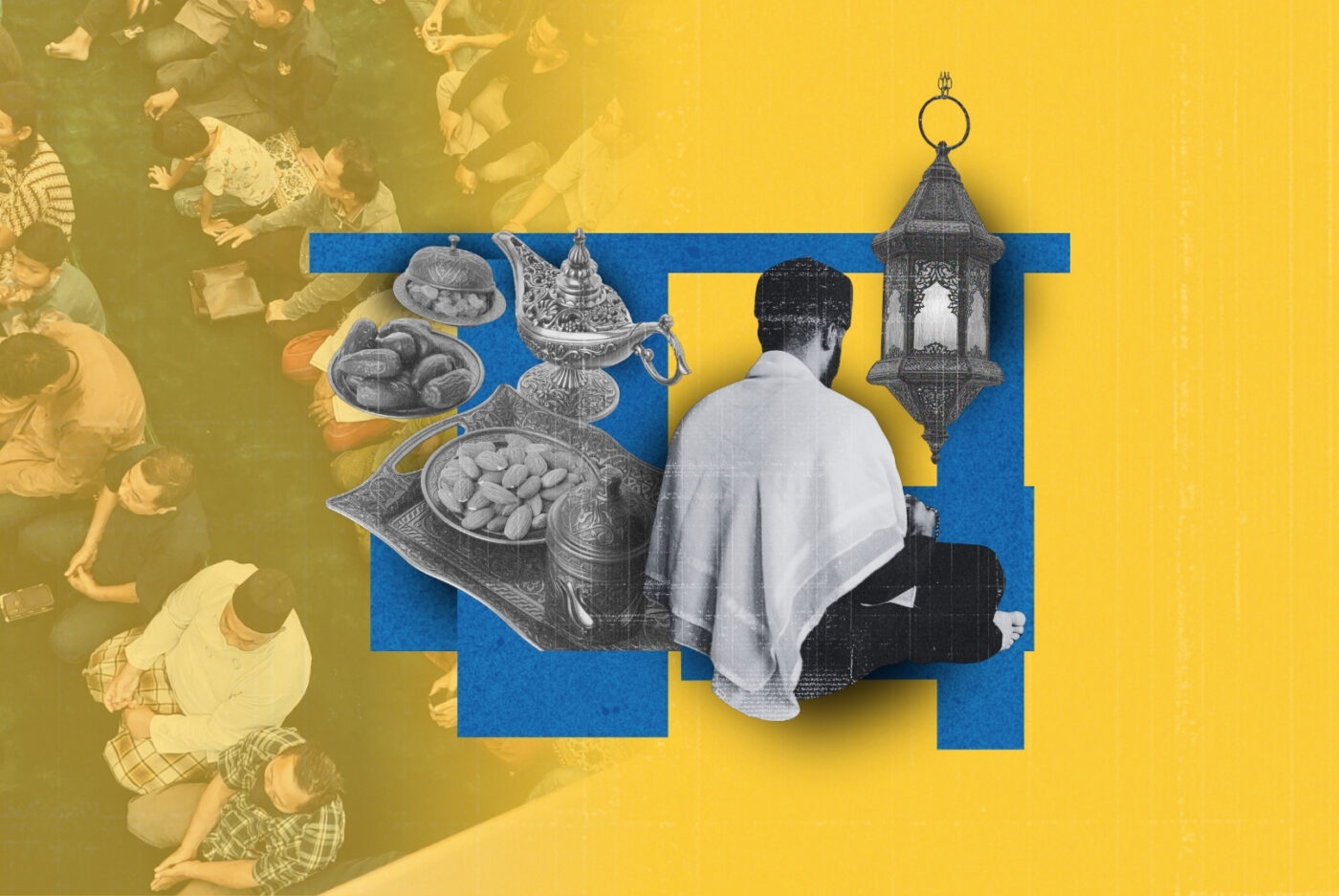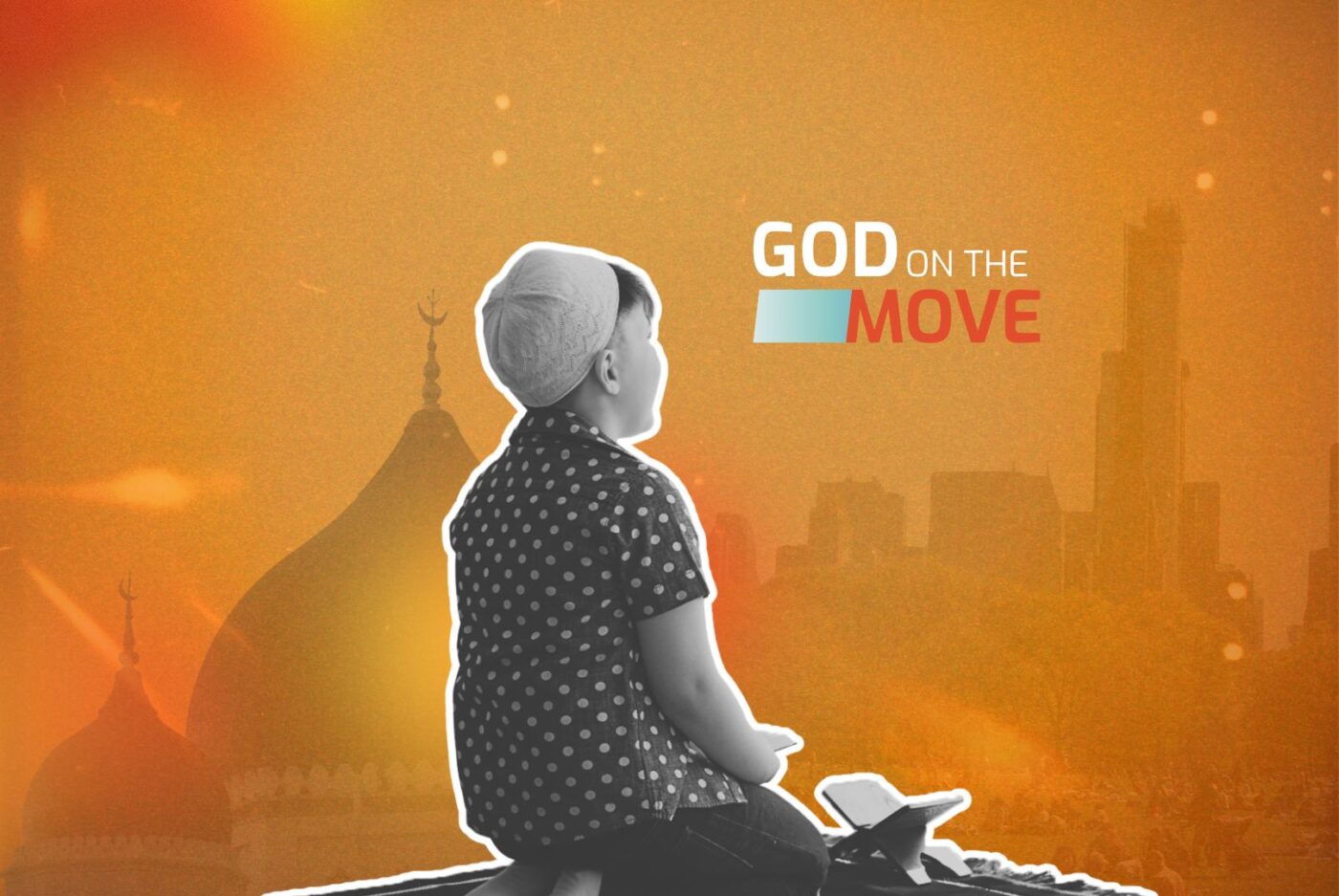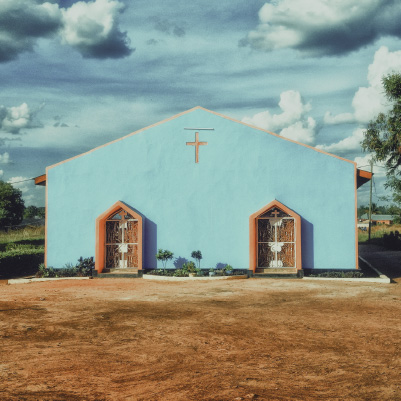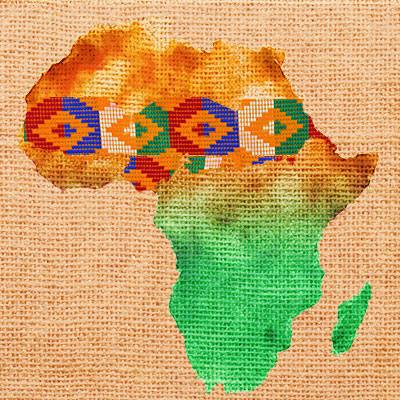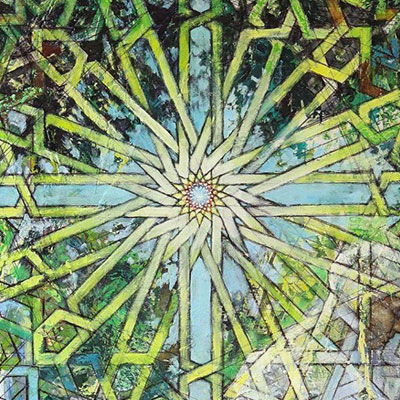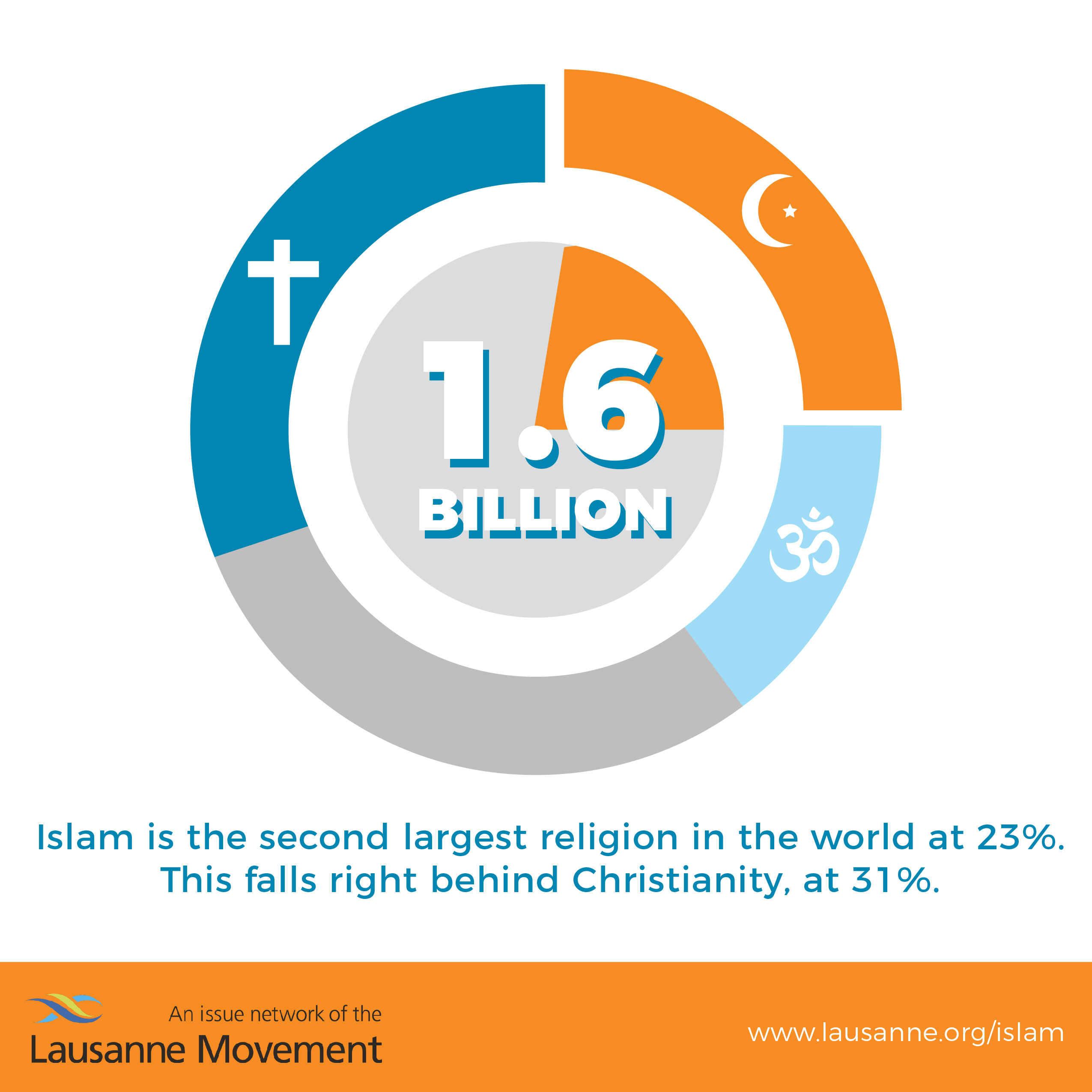Islam
Islam Today
The Pew Research Center predicted in 2011 that the Muslim population would increase by 35 percent from 1.6 billion in 2010 to 2.2 billion by 2030. With this increase, we would see 79 countries with a million or more Muslim inhabitants in 2030, up from 72 countries in 2010. At that rate of increase, we could expect to see Muslims comprise 26.4 percent of the world’s projected population of 8.3 billion in 2030. 1
The Middle East-North Africa region is predominantly Muslim, but as of 2010, only one-in-five Muslims lived in that part of the world. In the Asia-Pacific region, for instance, the Muslim population is expected to reach nearly 1.5 billion by 2050, up from roughly 1 billion in 2010. The number of Muslims in the Middle East-North Africa region is expected to increase from about 300 million in 2010 to more than 550 million in 2050. The Muslim population in sub-Saharan Africa is forecast to more than double, growing from about 250 million in 2010 to nearly 670 million in 2050. The absolute number of Muslims is projected to increase in regions with smaller Muslim populations, including Europe and North America.2
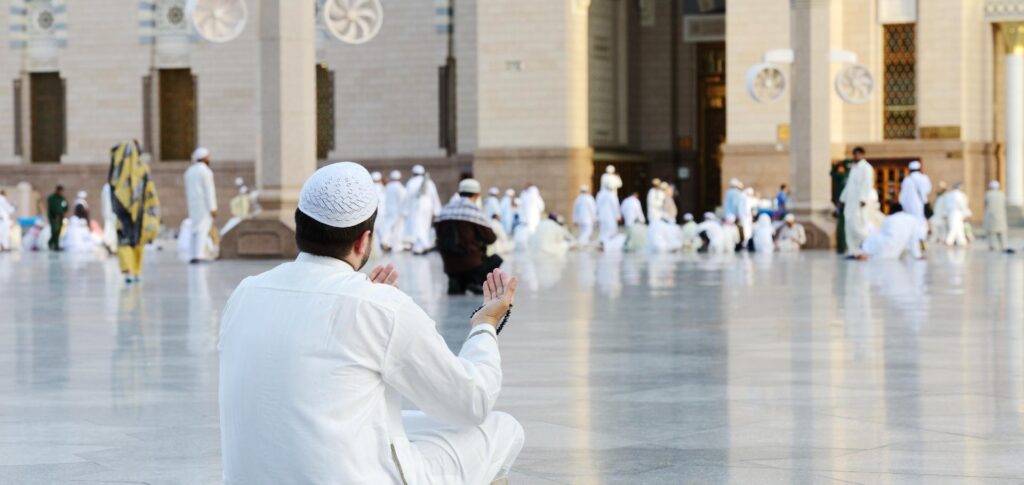
Diverse and Evolving
In an earlier study involving more than 38,000 face-to-face interviews in over 80 languages, Pew reported that Muslims are unanimous that there is only one God, and that Muhammad is his prophet. At the same time, however, Muslims also have significant differences according to their levels of religious commitment, openness to multiple interpretations of their faith, and acceptance of various sects and movements.
Some of these differences are apparent at a regional level. For example, Muslims in every country surveyed in sub-Saharan Africa, Southeast Asia, South Asia, the Middle East, and North Africa say that religion is vital in their lives. But religion plays a much less central role for some Muslims, particularly in nations that have only recently emerged from communism. No more than half of those surveyed in Russia, the Balkans, and the former Soviet republics of Central Asia say religion is vital in their lives.3
Islam is a diverse and multifaceted religion with followers spanning various cultures, countries, and historical contexts. As modernism enters traditional Islamic regions, many changes are taking place. These moves toward modernization ought not be oversimplified. Islam itself—from Indonesia to Morocco—is profoundly diverse, as are the changes it is undergoing.
On the Move
One noteworthy dynamic is the migration of Muslims. An estimated 3.7 million Muslims migrated to Europe between mid-2010 and mid-2016. Muslims are expected to make up a maximum 14 percent of Europe’s population in 2050.4 As an example, from 2010 to 2016, Germany accepted an estimated 670,000 refugees, roughly 86 percent of whom were Muslims. In addition, 680,000 regular migrants from outside the EU came to Germany during the same period, although a smaller percentage of these migrants (40 percent) were Muslims. Altogether, Germany received a total of about 1.35 million migrants during this period, including an estimated 850,000 Muslims.5
As Muslims continue to migrate in the era of globalization, they come to interact with the culture and religion of new regions. Because of this, Islam and Muslims face many changes and challenges both internally and externally. Consequently, the diversity of Islam and Muslims is accelerating.
Islam’s Global Influence
In the era of globalization, Muslims have migrated all over the world, and today they live in far greater numbers outside the Arab world. An estimated 61 percent of the worldwide Muslim population lives in the Asia Pacific area, while 20 percent live in the Middle East and Northern Africa.6 Muslim communities have migrated and established diasporic communities in various parts of the world. These communities have contributed to their host countries’ cultural, economic, and social fabric, enriching diversity and fostering multicultural societies. In particular, Asia is home to an incredible 1 billion Muslims. Because of this, Asians can often meet Muslims in the immediate neighborhood. As such, daily conversations about religious freedom, women’s rights, terrorism, immigration, and interfaith dialogue are often intertwined with discussions about Islam and Muslims. These issues are complex and vary across contexts, requiring nuanced analysis and understanding.
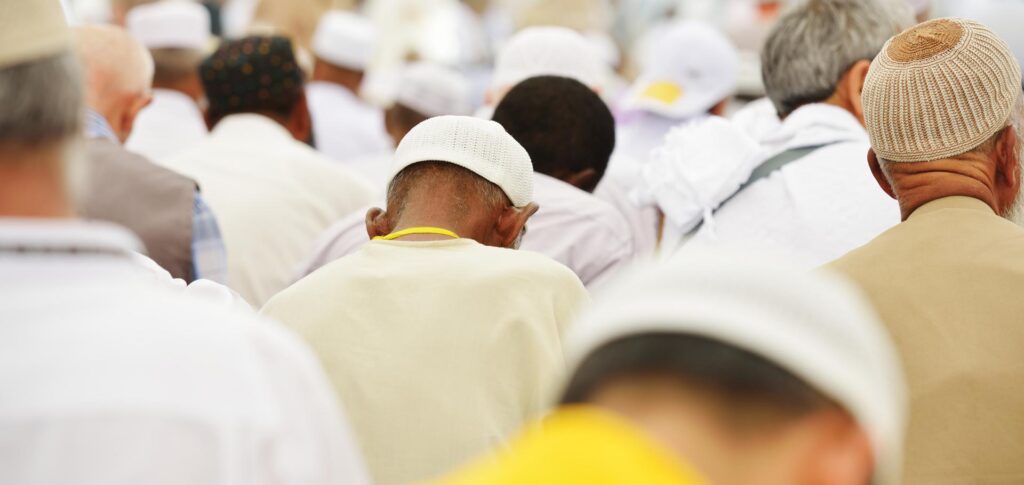
In the Secular Realm
The growth of Islam requires the Christian church to understand it accurately. Some nations are secular; others enforce Sharia. Some protect Christian minorities; others discriminate against them. Also, among Muslims, there are some of the richest and poorest people in the world. In addition, Muslims occupy a genuinely diverse spectrum, from world-class scholars to terrorists. Wealthy Muslims greatly influence the global economy based on their enormous financial power.
A representative field for this phenomenon is sports. The 2022 FIFA World Cup was held in Qatar, reflecting the climate of the Middle East for the first time in World Cup history. Qatar will also host the AFC Asian Cup in February 2024. In addition, the wealthy in the Middle East own several teams in the English Premier League (EPL), and their enormous financial resources afford them strong influence. The most representative team is Manchester City, which has won the EPL four times in the last five seasons and is said to be the most competitive in the world. The club is owned by City Football Group (CFG), a company based in the United Arab Emirates. CFG is majority-owned by the Abu Dhabi United Group, which Sheikh Mansour bin Zayed Al Nahyan, a member of the royal family of Abu Dhabi, controls.
However, it is estimated that a significant proportion of the world’s poor population resides in Muslim-majority countries or communities with a significant Muslim population. According to the Pew Research Center, as of 2010, nearly two-thirds of the world’s Muslim population lived in countries where Muslims were either a majority or a significant minority.7 Several Muslim-majority countries, such as Afghanistan, Somalia, Sudan, Yemen, and some countries in sub-Saharan Africa, are known to have high poverty rates and face significant development challenges.
The growth of Islam requires the Christian church to understand it accurately.
On the Christian Church
This influence of Islam has inevitably spurred greater interest within the Christian church toward Islam and Muslims. However, Christian churches that have never experienced Muslims as neighbors often have a limited understanding or even a phobic perspective rather than understanding Islam and its diversity. Islamophobia is also common in Korea, and Jeeyun Kwon summarizes its main concerns as marriage, CIA reports, and the increase in the Muslim population. ‘Muslims are planning to expand Islam in Korea by marrying Korean women, there is a CIA report explaining the 8-step world conquest strategy of Islam, and a propagation strategy to Islamize Korean society by infiltrating 150,000 Muslims in Korea (including violent methods). Or the Islamization of Europe will be reproduced in Korean society.’8
Therefore, the Lausanne Movement has emphasized the need to correctly understand Muslims and Islam since the 2004 Forum for World Evangelization. ‘There should be a focus on overcoming fear and prejudice towards Muslims, motivating people to build positive relationships with Muslims, including information on how to live as neighbors with Muslims, providing accurate information on Islam and the diversity of Muslims.’9

Christian Mission and Islam
Amidst this diversity, Christian mission related to Islam differs from region to region. In certain areas, Christian mission work is progressing. For example, in Indonesia, a country with religious pluralism, Christians can enter the country with a pastor’s visa. Accordingly, they can faithfully carry out missionary work with local denominations and seminary ministries. However, many countries still do not allow missionaries to enter the country, especially in the case of pastors. In those countries, the death penalty may occur if a native converts to Christianity.
In this situation, Christian missions would do well to apply two positions of the Lausanne Movement in their own work. First, the Lausanne Movement has consistently insisted that people of other religions, including Muslims, be respected, loved, and served as neighbors despite differences.
It is vitally important that Christians maintain a presence as authentic Christ-like lives alongside Muslim neighbors, friends, colleagues, and contacts. Such a presence can assist to break down barriers and demonstrate the love of God for Muslims. Therefore we encourage Christians everywhere, wherever possible, to intentionally live out their faith alongside Muslims in neighborhoods and workplaces, and not to retreat from contact with Muslims.10
Second, Christianity must closely examine and understand the unique characteristics of Islam and Muslims in each context to fully convey the gospel of Christ.
The church informs itself concerning the geo-political issues which impact missions to Muslims and engage in the task of understanding the geo-political world view of Muslim communities. The church must also keep itself informed of the political situation in nations where Muslims are found, and take steps to understand the way that this impacts existing Christian populations as well as on the practice of Christian mission to Muslims.11
Opportunities and Challenges for Achieving the Great Commission
It is difficult to predict what may happen in the future, as the world is undergoing rapid changes in all fields. Dramatic political changes are underway as regional and international alliances collapse, and conflicts accelerate between countries. Many countries also suffer from internal conflicts between tribes, ethnic groups, and religions. Rapid economic changes have caused forms of suffering in most countries. These rapid changes complicate the task of predicting the state of the Great Commission in 2050. However, we will try to discern a vision for the future in light of available information and recent developments. Above all the predictions for the future, we must look at God’s sovereignty and the work of the Holy Spirit to create a new reality that may exceed our human expectations.
Above all the predictions for the future, we must look at God’s sovereignty and the work of the Holy Spirit to create a new reality that may exceed our human expectations.
Challenges and Opportunities within Islam
Opportunities and challenges cannot be separated. Every challenge carries within it an opportunity, and likewise, every opportunity carries within it challenges. We will try to summarize some of the opportunities and challenges while leaving room for further in-depth and comprehensive studies.
The Islamic world is going and will go through many changes, whether in terms of religious thoughts or the relationship between Muslims and non-Muslim minorities within the Islamic world. These changes directly impact the possibility of achieving the Great Commission among Muslims.
Islamic religious thoughts exist between two extremes. On the one hand, there is the fundamental Islamic approach of Salafi Jihadist ideology, which calls for returning to the early days of Islam and emulating the Prophet, his companions, and the early caliphs. Most probably, these ideologies will continue to impact the Muslim world and the rest of the world in many aspects.12 Salafi jihadist adherents adopt a violent approach to spreading Islam and establishing an Islamic caliphate. The world has seen what such terrorist groups like ISIS, Boko Haram in West and Central Africa, the Muslim Brotherhood in Egypt, and other similar groups have done. Their ideology relies on the notion that Allah commands them to wage jihad through carrying arms against the infidel West and against Muslim rulers who, from their perspective, do not apply Sharia law.
This religious challenge carries negative aspects that affect the Christian world and Christian witness. Salafists seek to expel minorities from Islamic countries, as we have seen in Iraq, Syria, Palestine, Sudan, and other countries. This has manifested in acts of discrimination, persecution, and restrictions on having Christian service in Islamic communities.
Every challenge carries within it an opportunity, and likewise, every opportunity carries within it challenges.
Despite this negative influence, such violent practices have opened doors for Muslim youth who are exposed to global perspectives about freedom of thought and human rights, leading them to compare Salafi jihadist ideology and its violent practices with Christian thoughts that embrace peace, non-violence, and forgiveness. This contrast encourages young Muslims to search for Christian faith and follow it. It is likely that Islamic jihadist practices will continue in the East and expand in the West. All of this creates challenges but at the same time opens the door to opportunities for the Great Commission to present Christ as the Prince of Peace.
On the other end is the liberal Islamic ideology, which is influenced by Western intellectual trends that subject everything to scrutiny and criticism, including Islamic religious sources and practices. Its proponents appear in academic and media circles. Muslim liberals adopt principles of criticism and scientific interpretation of the Quran and Hadith, calling for purifying Islamic heritage from calls for violence and extremism and from ideas that contradict science and reason. These teachings may lead towards atheism or not necessarily adhere to Islamic religious obligations, while others may turn towards Christianity in search of answers to their questions.13
Between these two ideologies—the Salafi-jihadist and the liberal—exist many intellectual schools. Many Muslims around the world practice folk Islam and know little about the history and complexities of the faith. However, the intellectual movement in Islam creates challenges for Christians as well as opportunities. It will open the horizon for Christians who are involved in introducing the gospel to Muslims to study more about these developments. Workers among Muslims need to understand how Islamic thoughts develop in order to build bridges with Muslims in new ways, conveying the message of the gospel in a modern way that addresses Islamic minds and thoughts.
Challenges and Opportunities within the Church
As for the mission of the church towards Islam, Christians have taken many steps to achieve the Great Commission among Muslims. They have led an increasing number of converts from Muslim backgrounds towards Christianity. The methods of service and strategies have diversified to become more mature and impactful. Despite some encouraging results, however, challenges persist. The Western church that sent many missionaries and workers to the Islamic world during the past two centuries needs to realize the new changes in mission. It is expected that the direct role of Western missionaries to the Islamic world will shrink in the coming era. The presence of Western missionaries in many Islamic countries is complicated today due to political, religious, cultural, and security reasons. Nevertheless, opportunities exist for missionaries to achieve the Great Commission through their talents in education, technology, administration, fundraising, and networking between churches and mission organizations.14 On the other hand, the church presence in the Islamic world is an important tool for achieving the Great Commission. Despite the persecution, discrimination, and migration to the West that the church in the Islamic world has faced, it is encouraging to see a growing awareness of its role in God’s mission and a correction to negative past experiences.
The missionary awareness of the church in the Islamic world has increased, where educational opportunities about missionary work are available in theological colleges, national churches, and mission organizations. Moreover, the number of nationals interested in missionary work has increased, both those who serve outside their countries to reach new fields in the Middle East and those in the diaspora. The number of short- and long-term missionaries to Islamic countries has been increasing. Satellite channels and social media have played a significant role in reaching many Muslims with the message of the gospel. It is expected that the awakening of the church in the Islamic world towards achieving the Great Commission will continue through 2050. The number of national missionaries inside or outside their countries is expected to increase.
One of the most important factors in carrying the gospel to Muslims is the breaking down of the barrier of fear that has hindered Eastern Christians from delivering the message of the gospel to Muslims.
One of the most important factors in carrying the gospel to Muslims is the breaking down of the barrier of fear that has hindered Eastern Christians from delivering the message of the gospel to Muslims. For 14 centuries, Eastern Christians have suffered from persecution, discrimination, and rights deprivation, which created an unhealthy fear barrier towards Muslims. However, due to increased awareness of the missionary role and political and human rights developments, some Christians have broken this barrier and started seeking to achieve the Great Commission.15 It is expected that the courage of the national church will increase to share their faith without fear in the coming years.
It is also expected that cooperation between Western churches and mission organizations and the church in the Islamic world will increase in an interactive way through equality, understanding, and partnership. Each part has potential and resources that can contribute to achieving the Great Commission.
If the voice of the church in the West calls for freedom of thought and choice of religion, and if the church in the East continues to present a living Christian testimony of its faith, and if the church in the West and East unite in a strategic partnership full of mutual trust, submission, prayer, Holy Spirit work, and resource-sharing, all of this will lead to a real awakening towards achieving the Great Commission among Muslims.16
The church in the Islamic world and in the diaspora knows a lot about Islam and Muslims and how to deal with them and share the message of the gospel with awareness and enlightenment. The diaspora church can be an effective tool in leading the Western church towards delivering the message of the gospel to Muslims who live in countries where a climate of freedom enables establishing relationships, friendships, and providing Christian love service.17 This will create opportunities to achieve the Great Commission until 2050.
Resources
- Gene Daniels, Pam Arlund, and Jim Haney, eds. Fruit to Harvest: Witness of God’s Great Work Among Muslims (Littleton, Co: William Carey Press, 2019).
- Don Little. Effective Discipling in Muslim Communities: Scripture, History and Seasoned Practices. (Downers Groves, IL: IVP Academic, 2015).
Endnotes
- ‘The Future of the Global Muslim Population.’ Pew Research Center. 27 January 2011. https://www.pewresearch.org/religion/2011/01/27/the-future-of-the-global-muslim-population/.
- ‘Muslims.’ Pew Research Center. 2 April 2015. https://www.pewresearch.org/religion/2015/04/02/muslims/.
- ‘The World’s Muslims: Unity and Diversity.’ Pew Research Center. 9 August 2012. https://www.pewresearch.org/religion/2012/08/09/the-worlds-muslims-unity-and-diversity-executive-summary/.
- ‘Europe’s Growing Muslim Population.’ Pew Research Center. 29 November 2017. https://www.pewresearch.org/religion/2017/11/29/europes-growing-muslim-population/.
- ‘The Growth of Germany’s Muslim Population.’ Pew Research Center. 29 November 2017. https://www.pewresearch.org/religion/2017/11/29/the-growth-of-germanys-muslim-population-2/.
- ‘Islam: An Infographic.’ The Lausanne Movement. https://lausanne.org/content/islam-an-infographic.
- The Future of the Global Muslim Population.’ Pew Research Center. 27 January 2011. https://www.pewresearch.org/religion/2011/01/27/the-future-of-the-global-muslim-population/.
- Jeeyun Kwon. ‘The Korean Church’s Missional Approach to Korean Islam.’ Muslim-Christian Encounter 7 (2014/1), 9-57.
- ‘Lausanne Occasional Paper No. 49: Understanding Muslims.’ The Lausanne Movement (2004), 4.1. https://lausanne.org/content/lop/understanding-muslims-lop-49.
- Ibid., 4.2.
- Ibid., 4.3.
- Colin Chapman. Cross and Crescent: Responding to the Challenges of Islam, 2nd ed. (Downers Grove, IL: IVP, 2007), 160.
- S. Hassan. Christians Versus Muslims in Modern Egypt: the Century-long Struggle for Coptic Equality (Oxford: Oxford University Press, 2003), 222.
- Michael Kuhn. ‘The Challenge and Promise of Christian Mission to Muslims in a Neocolonial Era.’ Missiology: An International Review 49, no. 1 (2021): 54–68.
- Tharwat Wahba. The Practice of Mission in Egypt: A Historical Study of the Integration between the American Mission and the Evangelical Church of Egypt, 1854–1970 (London: Langham Monographs, 2015), 128.
- Robert D. Woodberry. ‘The Missionary Roots of Liberal Democracy. American Political Science
- Paul Borthwick. Western Christians in Global Mission: What’s the Role of the North American Church (Downers Grove, IL: InterVarsity Press, 2012), 41.
